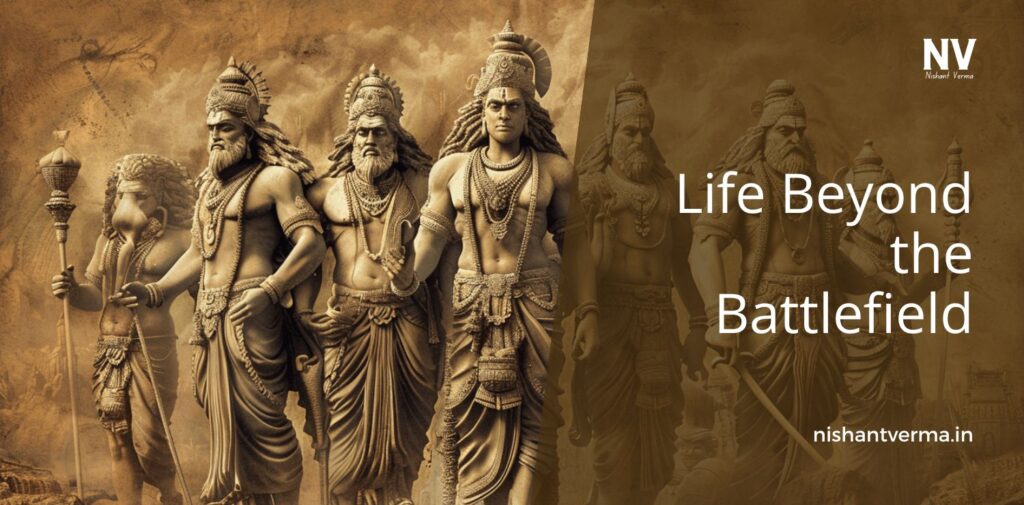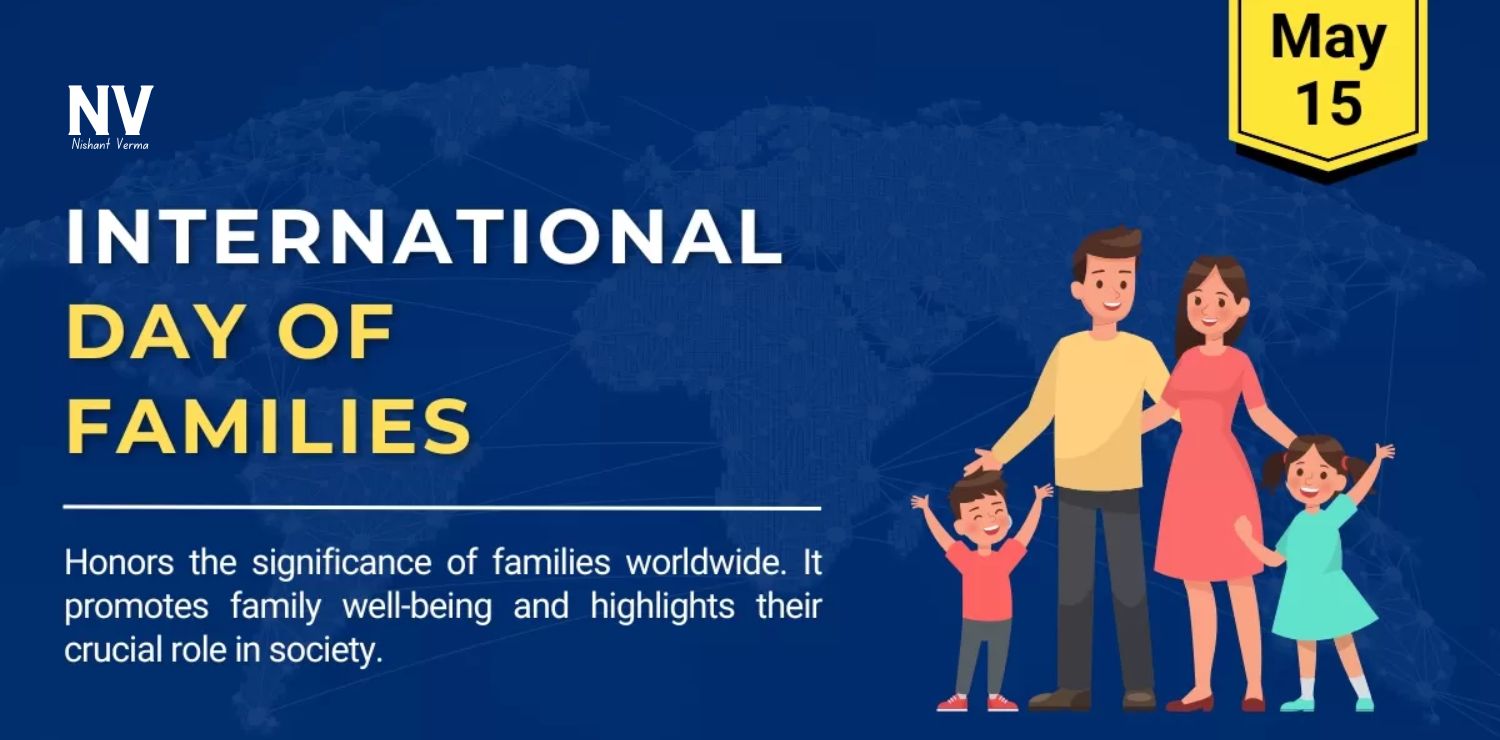The Hindu scriptures, especially the Mahabharata, Ramayana, and other sacred texts, are not just stories or religious teachings—they are timeless guides to life. These ancient epics offer profound wisdom on how to live a life of righteousness, fulfill our duties, and seek justice in the face of challenges. Through the stories of heroes, gods, and divine wisdom, these epics teach us lessons of Life Beyond the Battlefield. While the Mahabharata and Ramayana are often remembered for their great wars, their deeper messages resonate in our everyday lives, helping us understand how to navigate life’s complexities.
The Heart of the Mahabharata: Dharma and Righteousness
The Mahabharata, one of the longest and most important epics in Hinduism, is centered around a great war between two families: the Pandavas and the Kauravas. The epic is full of heroes, villains, gods, and sages, but at its core, it teaches us about dharma—the moral law that governs human life.
In the Mahabharata, characters are constantly faced with difficult choices where they must choose between what is right (righteousness) and what is easy. One of the most significant lessons from the epic is that righteousness isn’t always clear-cut. The right path often involves sacrifice, and sometimes, doing the right thing means going against our desires or the expectations of others.
For example, Arjuna, the great warrior of the Pandavas, faces a moral dilemma on the battlefield. He does not want to fight in a war that will destroy his family and friends. At this moment of crisis, Lord Krishna, his charioteer, offers him divine counsel. Krishna teaches him that it is his dharma as a warrior (Kshatriya) to fight for justice, even though it might seem painful or unfair. Krishna’s teachings emphasize that everyone has a unique role or dharma, and we must perform our duties to the best of our abilities, without attachment to the results.
Through Arjuna’s story, we learn that life’s challenges often force us to make difficult decisions, and the best course of action is usually the one that upholds truth and justice, even if it brings personal suffering or sacrifice.
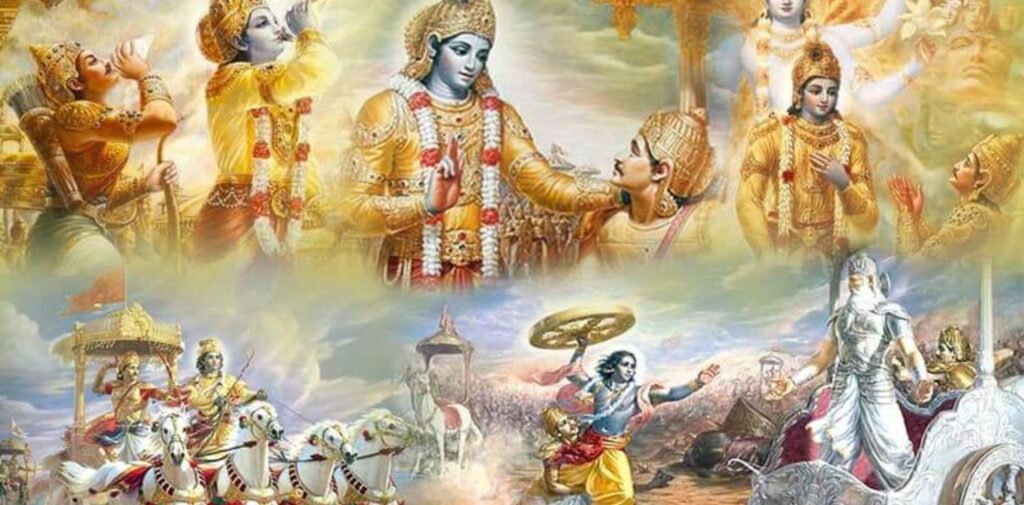
The Ramayana: The Power of Virtue, Duty, and Loyalty
The Ramayana, another key epic, is the story of Lord Rama, an incarnation of the god Vishnu, and his journey to rescue his wife, Sita, from the demon king Ravana. At its core, the Ramayana is a story of virtue, loyalty, and duty.
Lord Rama’s life is a model of how we should conduct ourselves, especially in times of hardship. He faces numerous challenges: the betrayal of his stepmother, exile into the forest, the abduction of his wife, and the ultimate battle with Ravana. Despite all these struggles, Rama never wavers in his commitment to his duty, his moral principles, and his responsibilities.
One of the key lessons from the Ramayana is the importance of dharma—doing what is right, even when it is difficult. Rama’s actions demonstrate that fulfilling one’s duty—whether as a son, husband, or king—comes before personal desires. Even when his wife, Sita, is taken by Ravana, Rama’s duty as a husband compels him to rescue her, no matter how daunting the task. This teaches us that true virtue lies in being loyal to our responsibilities and standing by our loved ones, no matter the hardships.
The Ramayana also emphasizes the importance of respecting others and being just in all actions. Ravana, despite his great power and wisdom, is eventually defeated because he chooses arrogance, injustice, and greed over righteousness. In contrast, Rama’s humility and sense of justice lead him to victory. This teaches us that no matter how powerful we become, righteousness and virtue are the true sources of strength.
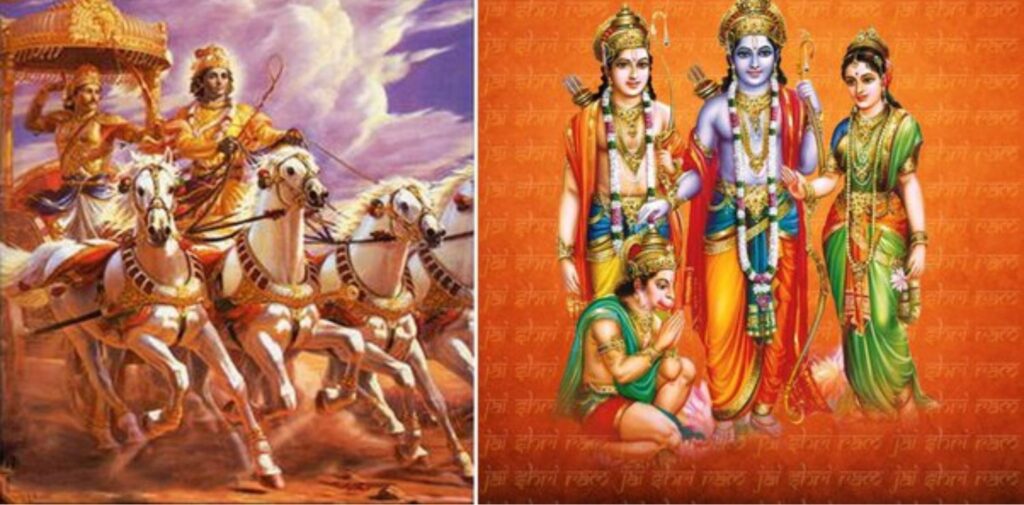
Lessons from the Bhagavad Gita: Detachment and Selflessness
The Bhagavad Gita, part of the Mahabharata, is one of the most influential spiritual texts in Hinduism. In this conversation between Lord Krishna and Arjuna on the battlefield, Lord Krishna imparts wisdom about the nature of life, duty, and the self.
One of the most important lessons from the Gita is the concept of karma yoga, or the yoga of selfless action. Krishna teaches that we must do our duties without attachment to the outcomes. In simple terms, this means we should act because it is the right thing to do, not because of the rewards we expect to receive. This idea helps us remain calm and content even when life does not go as planned.
Krishna also teaches Arjuna the importance of detachment—being involved in the world, but not letting our desires and emotions control us. By doing our duties without attachment to success or failure, we maintain inner peace and focus on what truly matters.
The Gita also emphasizes the importance of inner strength and balance. It teaches that life is a constant battle, but the true fight is not against others; it is against our own weaknesses, desires, and fears. By cultivating virtues like patience, courage, and humility, we can overcome the obstacles life throws our way and live a life of purpose and meaning.
The Upanishads: The Journey to Self-Realization
The Upanishads, another set of sacred texts, focus on the nature of reality, the self (Atman), and the ultimate truth (Brahman). These teachings offer deeper spiritual insights, urging us to look beyond the physical world and seek enlightenment within.
One of the central teachings of the Upanishads is that the true self is not the body, nor the mind, but the eternal soul (Atman). The Upanishads guide us toward self-realization by encouraging us to meditate, reflect, and detach ourselves from the illusions of the material world. By understanding the true nature of the self, we can live a life of peace, compassion, and understanding.
This idea of self-realization connects with the lessons of duty and justice found in the Mahabharata and Ramayana. While these epics show us how to act in the world, the Upanishads remind us that we must also act with an awareness of our deeper, spiritual nature. When we understand our true self, we can live harmoniously with others and make choices that benefit the greater good.
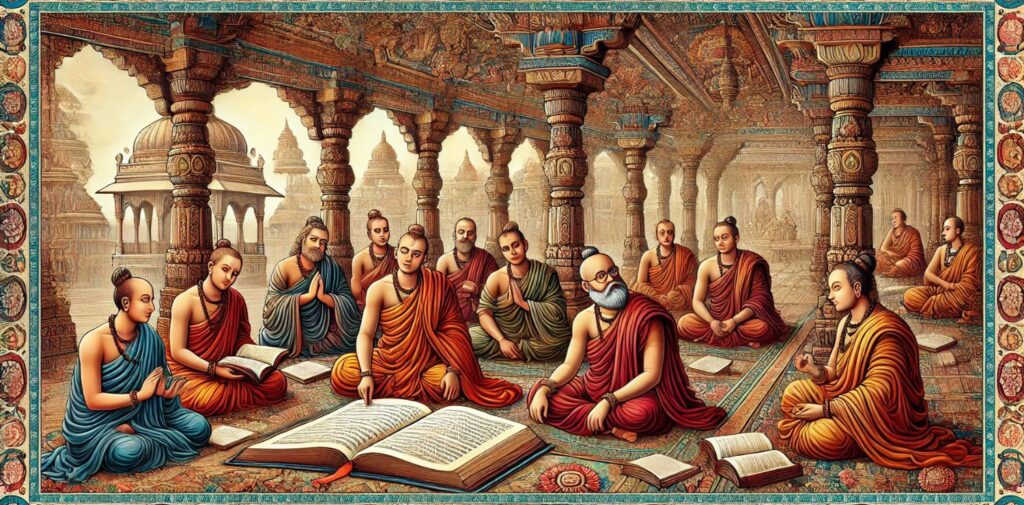
Living a Life of Righteousness and Justice Today
Although the Mahabharata, Ramayana, Bhagavad Gita, and Upanishads were written thousands of years ago, their teachings are incredibly relevant in our lives today. The principles of righteousness (dharma), duty, justice, and selflessness help guide us in making ethical decisions and living in harmony with others.
In today’s world, we often face situations where the right path is not obvious. We may feel torn between personal desires and what is morally right. The teachings from these epics urge us to think carefully about our actions, seek justice, and stay true to our values. Whether it’s standing up for what’s right at work, maintaining integrity in our relationships, or staying patient in the face of challenges, these ancient lessons offer timeless wisdom.
Righteousness does not mean perfection; it means doing our best, being true to ourselves, and helping others along the way. Justice is not about revenge, but about fairness and compassion. And duty is not about blind obedience, but about taking responsibility for our roles and making decisions that benefit the greater good.
Conclusion: Life Beyond the Battlefield
The teachings of the Mahabharata, Ramayana, Bhagavad Gita, and Upanishads guide us to live a life of meaning, filled with purpose, justice, and righteousness. While these ancient epics were written in a different time and context, their wisdom continues to offer profound lessons that can help us navigate the challenges of the modern world.
The ultimate battle, as these texts teach, is not fought on a physical battlefield but within our hearts and minds. By understanding our duty, acting with righteousness, and seeking justice, we can overcome the struggles of life and live with a sense of peace, fulfillment, and purpose.
The lessons from the Hindu holy books encourage us to live beyond the battlefield of conflict and ego, embracing the higher path of love, truth, and self-realization. This is the path to a truly meaningful life.

